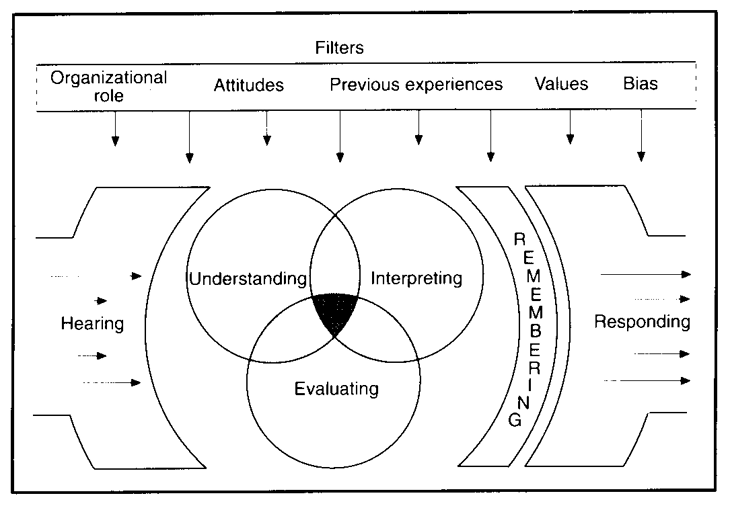
A few weeks ago, I had an alarming revelation: I'm a crappy listener.
That came to light when someone important to me pointed out that I don't seem to have any interest in what he does for work. “Your eyes just glaze over whenever I talk about my job,” he told me.
I couldn't deny that. And it wasn't limited to him -- whenever someone spoke to me about something that I found less than fascinating, I had a tendency to tune it out. In reality, I could learn to appreciate my friend's line of work, for example, if I learned to listen actively.
It's an imperative skill -- at work, and in your personal life. After all, if you’re never paying attention to what your boss, your significant other, or your kids are saying to you, how are they supposed to take you seriously? How can you expect them to come to you for advice, or with important information? When you don’t listen, you set the precedent that you can’t be trusted to absorb what matters to other people. 
That’s why it’s imperative to learn how to listen actively. It’s one thing to sit and make eye contact with the person speaking to you. But are you really absorbing what they’re saying? And moreover, are you responding in a way that communicates that you’re actually listening -- and that you have something worthwhile to say in return?
There are a few key phrases out there to demonstrate that you’re listening actively. And it’s true -- you’re not going to care about every conversation that someone initiates with you. But even if the topic isn’t important to you, the person sharing it might be. Read on to learn how to pay better attention, and how to show that you’re doing so.
How We Listen
The Process
To listen, according to Merriam-Webster, is “to hear what someone has said and understand that it is serious, important, or true.”
It’s that second part of the definition that stands out to me -- especially when it comes to active listening. It’s the genuine absorption of what someone is saying to us that reinforces and communicates how seriously we’re taking it, or appreciate its importance.
Of course, there are many reasons to listen. It helps us to satisfy different physiological goals. We listen to alter our moods, stay alert, and figure stuff out -- in humans, that’s been the case for pretty much as long as we’ve existed. The process starts when we receive auditory stimuli. Then, our brains have to interpret that stimulus. That's enhanced by other senses -- like sight -- which help us better interpret what we're hearing. That’s important. When someone is sharing information with us, our non-verbal reaction also communicates to that person how actively we’re listening.
Once we receive and interpret auditory signals, we follow a series of steps that consist of recalling, evaluating, and responding to the information we consume:

Source: Matthew Edward Dyson
All three of those steps are imperative to active listening. Numerous studies have discovered how listening triggers a widespread network of activity throughout the entire brain -- and it’s why auditory stimuli is often strongly linked to memory.
When We Don't Listen
Of course, we have to be paying attention in order to be able to recall, evaluate, and respond to what someone tells us. And even if we are, how we respond can send a variety of signals back to our conversational counterpart. Statements like, “I see,” or, “Cool,” for example, aren’t exactly active phrases. Rather, they exhibit a state of passive listening that communicates we hear the person, but probably don’t care.
And that’s not how anyone -- let alone important people in your life, like your family or your boss -- wants to be treated. Even if your significant other is telling you about his day, responding with something like, “Mm-hmm” doesn’t exactly send the message that you have great concern for what’s being said.
And even then, our intentions might be good. According to a coaching presentation created by Viorica Milea, there are many non-malicious explanations behind why we don’t listen. These are things like distractions, which abound in today’s device-centric world, and our tendency to start thinking ahead while the person is still talking -- what Milea calls "judging," which happens when we've preemptively "made assumptions" about what the person is going to say.
The Mutual Benefit of Active Listening
That’s why active listening is good for both parties in a conversation. It benefits the person speaking by helping to insure that she’s actually being heard. But it also benefits the listener -- learning to put distractions and preemptive judgments (well-intended or not) aside will not only prevent you from missing important details, but also, can help teach you how to tune out unnecessary interruptions while focusing on other important tasks.
Practicing the incorporation of these phrases into conversations is a great way to get started. When someone is speaking to you, keep these in mind -- if you feel your attention start to drift, or a notification appears on your phone, or you begin thinking ahead, come back to your mental inventory of these phrases to demonstrate and execute active listening.
6 Phrases to Demonstrate Active Listening
1) “Do you mean … ?”
Why
Sometimes, it seems like life is one long game of Telephone. Even if we interpreted something one way, the person who said it may have meant it completely differently.
That’s why it’s important to make sure you’re getting the full story from the person you’re listening to, and understanding it correctly. By asking for clarification, you’re not only encouraging more details from someone who might be timid about bringing something up, but also, you’re making sure you actually heard a statement as it was intended.
Alternatives
- “I’m not sure I understand.”
- “Could you tell me a bit more about that?”
2) “It sounds like … ”
Why
This phrase is another one that helps to provide clarification by demonstrating your empathy. But be careful with this one, and make sure you’re not telling your counterpart how she feels, but rather, phrasing it as an expression of how you interpret her emotions.
I have a tough time admitting when I’m upset about something, especially in a professional setting. But my manager happens to excel at active listening, and is very good at reading what I’m not saying in a conversation -- and responding in kind. When I was disappointed about the outcome of a project, for example, I didn’t exactly say so, but she said, “It sounds like you’re feeling a little defeated.” I was, and having her say that to me out loud helped me take a proactive approach to the project moving forward.
Alternatives
- “What I’m hearing is … "
- “You seem a bit … ”
3) “Really?”
Why
This phrase is one that Milea helps to demonstrate encouragement during a conversation. It reminds the person speaking that you’re paying attention by encouraging them to elaborate on something they’ve said to you.
Alternatives
- “When?”
- “How?”
- “You’re kidding.”
4) “I’ve noticed that … ”
Why
Here’s another term that shows how much attention you’re paying. By pointing out your observations about someone’s behavior or tendencies while she’s speaking, you’re not only fully absorbing her words -- you’re also taking the non-verbal communication into consideration.
Instructors at the University of Central Florida use the example of, “I’ve just been noticing that when you talk about your conclusions, you smile. That makes me think you’re comfortable with the direction.” Making sure you know what someone means isn’t limited to the spoken word -- you want to clarify what nonverbal behavior could indicate, too.
5) “Let me make sure I’ve got this right.”
Why
Another method of active listening is checking in with your counterpart to summarize what you’ve heard them say thus far. By repeating back something to the person you’re listening to, you’re not only demonstrating that you’ve been paying attention, but also, you’re further ensuring that you understand what the person actually means, and that you heard her correctly.
Alternatives
- “These are the main points I’ve heard you make so far.”
- “Let’s make sure I’m hearing you correctly.”
- “Let’s pause to make sure we’re on the same page.”
6) “I’m sorry. That really sucks.”
Why
I joke about this one with my colleagues a lot. It goes back to the big idea of empathy and those occasions when, for just a moment, you want to have a pity party, rather than receiving proactive advice. Of course, you’re ready for that advice eventually, but not right away.
That’s why, when someone is sharing his frustrations with you, one of the most impactful things you can do is verbally acknowledge how crummy the situation is. Rather than invalidating the person’s emotions by immediately launching into suggestions for what she should do, you’re pausing to provide empathy, and to allow the person to work through what’s bothering him.
Alternatives
- “I’m sorry you’re going through that.”
- “What a crappy situation to be in. I’m sorry.”
- “That’s rough. How can I help?”
Listen Carefully
We get it. You’ve got enough on your plate. There’s always a deadline, and there’s always somewhere you need to be. It can be hard to genuinely pay attention, especially when you’ve got a long to-do list that’s occupying your mental energy.
But as we’ve mentioned, active listening doesn’t just benefit your conversational counterpart -- you also stand to gain from it. From making sure you don’t miss important details, to exercising focus for any important task, putting these phrases into practice can help you become a proactive, empathetic listener.
What are your go-to phrases to demonstrate active listening? Let us know in the comments.

from HubSpot Marketing Blog https://blog.hubspot.com/marketing/phrases-for-active-listening

No comments:
Post a Comment